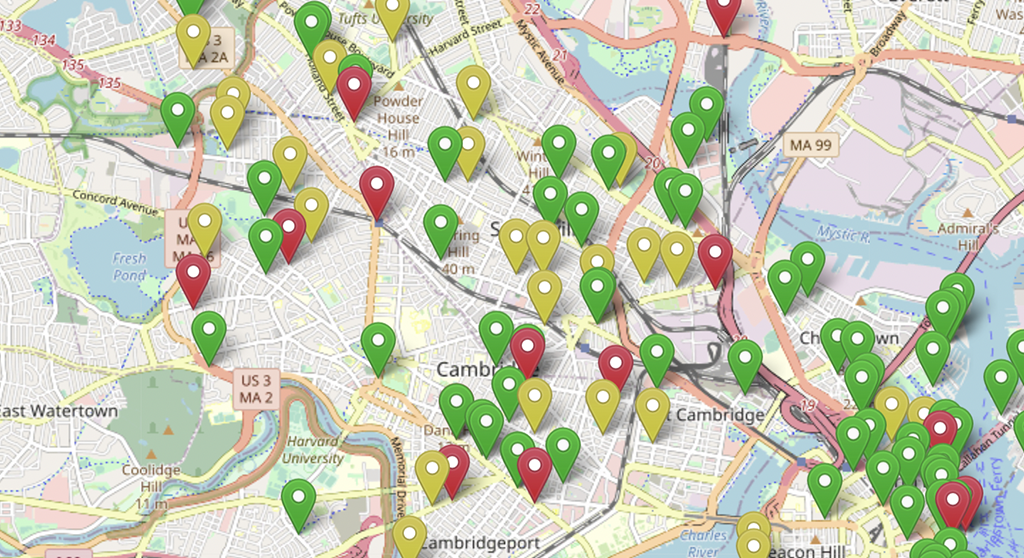Questions on embedding teen’s restroom map, but the fact is, when you gotta go, you gotta go
Even First Amendment issues were raised Tuesday as city staff considered whether a high schooler’s map of public bathrooms should make it onto Cambridge’s Open Data Portal, though everyone at the Open Data Review Board meeting agreed on one thing: The map is a good resource that should be available to everyone.
The map, at bathroomaccess.com, is the work of Amith Saligrama, a student at the Commonwealth School in Boston, who slots restrooms around Greater Boston into three categories: free facilities available year-round; seasonal ones, such as port-a-potties; and those only partially accessible that might come with a cost, such as in a coffee shop where toilets are for customers only.
The inspiration to build the site was Saligrama’s grandparents, who “began to limit their daily walks due to a lack of restroom access,” he said on its “about” page. “I realized that there are many people like my grandparents – parents with toddlers, taxi and delivery drivers – who need access to restrooms.”
The question in Cambridge was whether Saligrama’s work should go on the city’s growing Open Data Portal alongside its existing 363 assets, the newest of which range from budgets and crime reports to a daily crash log on transportation safety and a dataset of last year’s municipal electricity use. All were created by city staff or come from state or federal agencies, said Josh Wolff, the city’s open data program manager.
“Amith contacted us several weeks ago and said, ‘Hey, I have this really cool resource … and I’d love for you to link to it or host it on your website,” Wolff said. But Wolff could give only one response: “This is a larger discussion.”
During it, staff wondered how to ensure information is kept current, if the city would point people to restrooms with complications – such as in firehouses, where an emergency might call everyone away – and whether posting an individual’s dataset online would bring out others demanding their own dataset be posted, despite lower quality or less usefulness.
“This potentially opens a can of worms,” city demographer Cliff Cook said. “Go back to the early days of government websites when people thought the Web was going to be the solution to all problems. They quickly realized that if you leave the door open, all kinds of people walk in that you don’t necessarily expect.”
The city is already struggling with a government-provided but flawed dataset of charging sites for electric vehicles that can point sometimes desperate drivers to places they can’t go, such as corporate garages, Cook said.
City spokesperson Lee Gianetti agreed the city risked losing the ability to say no to a dataset provided by a member of the public, and that to “pick through what is going to get posted and what is not going to get posted” it would be necessary to get an opinion from the city’s Law Department on First Amendment ramifications.
How to vet the quality and accuracy of datasets offered by members of the public objectively was raised as an issue – or, alternatively, how to signal to users that the data was of a potentially different quality than what was offered by the city directly.
There are already examples of outside or hybrid datasets, board members noted: Cambridge’s Community Development Department has hybrid datasets on sustainable buildings based on LEED certification and median rents of apartments by number of bedrooms that borrows from data scraped by the Metropolitan Area Planning Council, Cook said.
Saligrama, who was on the call, suggested that the adults were overthinking the issue, as the data used on bathroomaccess.com was all public, much of it from the city’s own parks and Public Works staff.
“This data is not magical. My bathroom access is not something irreproducible. You don’t need to rely on me at all,” said Saligrama, who even dismissed the idea of needing credit if the city decided to create its own bathroom map. “I’m just saying that this sort of public bathroom information would be useful to have for Cambridge residents.”
A happy medium suggested during the conversation was to direct people to Saligrama’s site without hosting it – the solution Somerville city officials arrived at for their website’s “Getting Around Somerville” page, and something Cambridge’s Open Data Portal already does for other assets.
“There are a lot of public maps that I’ve seen on your website and many others that talk about water filling stations and places to go walking. There’s a lot of language that says we should be more active,” Saligrama said. “Why can’t we also have a map with Cambridge restrooms? This is also a fundamental part about being active outside.”



